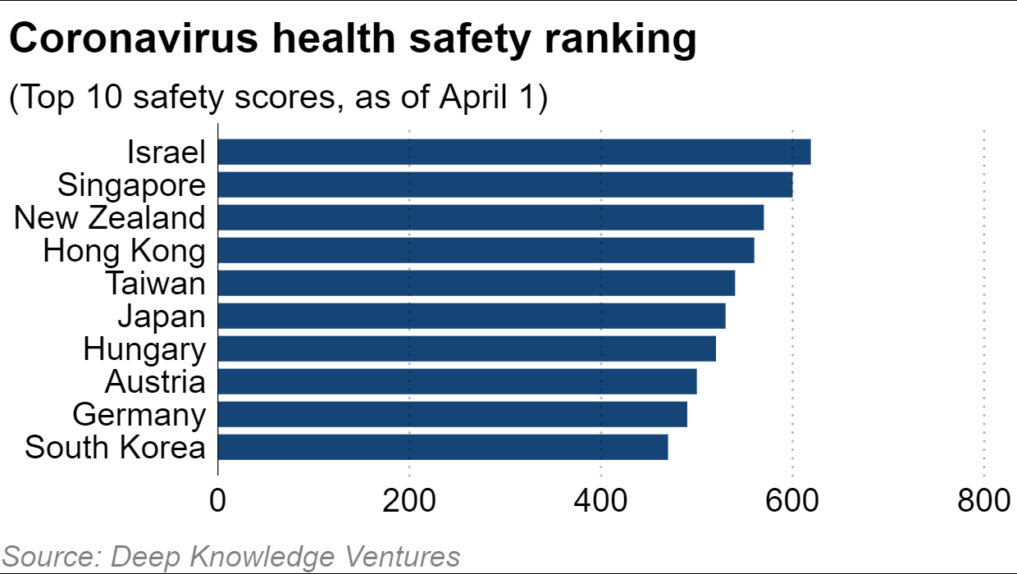Scientists Show How to Manage COVID-19 Pandemic Without Destroying the Economy
Sat 10:32 am +01:00, 13 Jun 2020On April 21, 2020, three Israeli scientists published a new study online: Managing COVID-19 Pandemic Without Destructing the Economy at: ArXiv (an Open Access archive for scholarly articles in physics, mathematics, and computer science owned by Cornell University.)
The authors are professors at Hebrew University.
Dr. David Gershon is CEO of SuperDerivatives, a market data analytics provider that developed benchmark pricing model for options. His PhD is in theoretical physics, and his MBA and MS is in Finance.
Dr. Alexander Lipton is Founder and CEO of Stronghold Labs, Co-Founder of Distilled Analytics, Partner at Numeraire Financial, Connection Science Fellow at MIT. Before switching to finance, he was a Full Professor of Mathematics at the University of Illinois. He is the author of seven books.
Dr. Hagai Levine, MD, a public health physician and leading infectious disease epidemiologist at the School of Public Health of HebrewUniversity. Their model is based on real-time data, taking into account populations of varied vulnerabilities.
“We analyze an approach to managing the COVID-19 pandemic without shutting down the economy while staying within the capacity of the healthcare system. We base our analysis on a detailed heterogeneous epidemiological model, which takes into account different population groups and phases of the disease, including incubation, infection period, hospitalization, and treatment in the intensive care unit (ICU). We model the healthcare capacity as the total number of hospital and ICU beds for the whole country.
We calibrate the model parameters to data reported in several recent research papers. For high- and low-risk population groups, we calculate the number of total and intensive care hospitalizations, and deaths as functions of time. The main conclusion is that countries, which enforce reasonable hygienic measures on time can avoid lockdowns throughout the pandemic provided that the number of spare ICU beds per million is above the threshold of about 100.”
The following excerpts are from reports about their study in Physics Organization ) April 27, Calcalistech and the Jerusalem Post. led them to conclude that the lockdown will cause more deaths than the virus:
“in countries where the number of ICU beds for COVID-19 patients is above 60 ICU beds per million (depending on the ratio between the high- and low-risk populations and the level of compliance of the population to the hygiene measures) then no lockdown is necessary, and when the number of ICU beds for COVID-19 per million people is below 60, then a temporary partial quarantine of the high-risk population may be required, but in any case, the economy can continue to operate and society can function normally.” [Phys. Org]
The model assumes that the goal is not to overburden the healthcare system, as opposed to reducing the amount of infection or saving lives. The scientists note that:
“If lockdowns are being implemented to buy time until a vaccine is developed or a treatment for the virus found, then lockdowns may potentially protect people from dying of COVID-19. However, such an approach will lead to economic mayhem, with many people dying from the consequences of economic and financial destruction.”
On the other hand, “if the lockdowns are to ensure the pandemic spreads slowly — “flattening the curve” – to ensure that healthcare systems with limited capacity are not overwhelmed, “such an approach can lead to reduced mortality, even if the total number of infections remains the same.”
“The model considers each of the stages of the disease and separates between different population groups (for example, by their vulnerability to the disease, residential density, behavioral characteristics, etc) and calculates the rate of infection, hospitalization and ICU beds for the different populations.
The model was calibrated with real-time data from recent research articles about COVID-19 in different countries about infection rates, hospitalization and deaths as well as number of patients in ICU.
As the number of recoveries from coronavirus (Covid-19) continues to exceed the number of new diagnoses in Israel, they argue that the lockdown measures implemented by the government over recent months were unnecessary and should be canceled immediately.
Israel’s population is 8,631 million (as of April 28, 2020).
According to data released by the Ministry of Health on April 26th,
- The number of confirmed coronavirus cases in Israel now stands at 15,398.
- The number of people who have died from complications related to the virus hit 200 on Sunday.
- 132 patients are in serious condition, including 100 in need of ventilator support.
- The number of Israelis who have recovered from the virus stands at least 6,602
- The number of recoveries have exceeded the number of new diagnoses for the 10th day in a row.
The Israeli government has started to roll back restrictions on Sunday, allowing all street-level stores, barbershops, and beauty salons to open, as long as they adhere to strict hygiene and distancing guidelines. However, the scientists the restrictions that had been put in place were unnecessary to begin with. According to the model, if a country adopts a policy of social distancing as much as possible, including at work, 14 days self-quarantine of every person with symptoms such as fever or cough, testing all individuals with symptoms and hygiene measures including face masks in public places, then in most cases there is no need for lockdown.
Their model shows that in Israel, under the worst assumptions and without any lockdown, the number of ICU beds for COVID-19 patients will not exceed 600. It was reported that before the COVID-19 outbreak, there were 2000 beds in Israel and currently around 3000 beds. This means that the lockdown was unnecessary and could be ended and replaced with a responsible policy of hygienic behavior in public places.
“Our research shows that if the goal was to prevent a shortage of ventilators in hospitals then the lockdown in Israel was unnecessary. The rate of infection already decreased rapidly when the lockdown began and was low enough that as long as the population continued to act responsibly, we wouldn’t have reached a situation where there would have been a shortage of hospital beds for coronavirus patients.”
Gershon told The Jerusalem Post: “We are not trying to minimize the number of people infected –
the price of the lockdown is too catastrophic
. The price of more than 1 million people unemployed is so crazy that to say we want to minimize the number of infected people is ridiculous.”
They applied their model to Sweden, Singapore, Taiwan and South Korea; countries that never implemented a lockdown, and the health system never got close to full capacity even thought the number of ICU beds per population is less than in Israel. Based on data provided by the Israeli Ministry of Health, on March 9th when the first cases of COVID-19 surfaced in Israel, the infection rate was very high; the reproduction number was 3.0. But because of the population awareness of the disease, and the cautious measures voluntarily taken by the majority of the population, the infection rate decreased significantly; the reproduction number was 1.3 on Maarch 22. This was all before the lockdown period. The subsequent reduction in infection was minor.
The scientists offer two reasons for the high mortality rate in Italy, Spain, and the US – despite the lockdowns. They note that in these countries the number of people who die each year from seasonal flu is also extremely high, most likely because a large proportion of their populations are aged and at high-risk. The second reason, they suggest is that by the time the lockdown was ordered, the number of infected people was already enormous. Had they been instructed to follow rigorous hygiene measures the rate of infection and death would have been significantly reduced
- “There is no reason to continue with the lockdown policy. The cost of the lockdown is astronomical, both from a financial and a human standpoint. Additionally, there is no doubt that the number of deaths that will be caused by the lockdown will be massive.”
The scientists are planning to carry out a systematic follow-up investigation of the death cases that are caused by the lockdown itself in the short and long term. They state in their paper:
“Such an investigation might show that the growth in the number of death cases related to lockdown is higher than the death cases related to COVID-19. It may have a similar effect to ‘Iatrogenesis’ in medicine, a phenomena where the medicine is more detrimental than the disease itself.”
They conclude:“It is important that all decisions regarding public policies and restrictions be taken based on real time data, and published to the public.”
Managing COVID-19 Pandemic Without Destructing the EconomyArXiv
How to Manage the COVID-19 Pandemic Without Destroying the Economy, Physics Organization, April 27, 2020:
Coronavirus Lockdown in Israel Was Unnecessary, Say Three Hebrew U Professors, Calcalistech
Scientists Show How to Manage COVID-19 Pandemic Without Destroying the Economy







